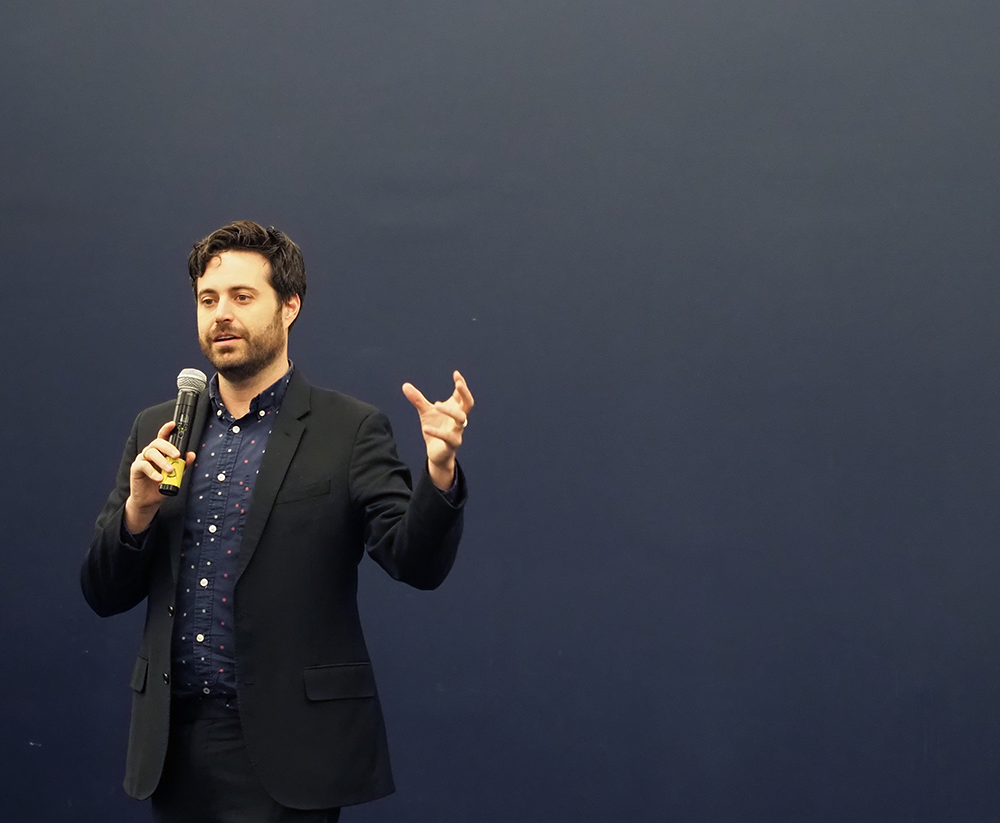A greater sense of compassion is needed to combat the persistent homophobia in various parts of the world, author and LGBTQ activist Garrard Conley said at an event Tuesday.
The event, titled “Radical Compassion with Garrard Conley,” was hosted by the Georgetown University Lecture Fund. At the event, Conley discussed his experience growing up in a fundamentalist Christian home in Arkansas and being enrolled by his parents in a conversion therapy program at the age of 19. This experience was the focus of Conley’s 2016 autobiography “Boy Erased: A Memoir,” which was later adapted into the 2018 film “Boy Erased.”

Conversion therapy is the practice of trying to change an individual’s sexual orientation using psychological or spiritual interventions. Although showing compassion toward those who hold homophobic beliefs may not change their beliefs, compassion can help survivors of conversion therapy process their trauma, according to Conley.
“We’re often told that if we just loved people enough, they would accept us. That’s not what I’m telling you here today,” Conley said. “I’m telling you here that I made this choice to be compassionate towards the people who had done bad things to me, as a way to retain my sanity.”
Although numerous medical organizations, including the American Medical Association and the American Psychiatric Association, have stated that there is no evidence indicating that conversion therapy is effective in changing sexual orientation, conversion therapy continues to be practiced in many parts of the country.
In addition to being ineffective at changing sexual orientation, conversion therapy can also have many negative effects on the mental health and wellbeing of LGBTQ people. Studies show that LGBTQ youth who are rejected by their families due to their identities are nearly six times more likely to report high levels of depression and more than eight times more likely to have attempted suicide when compared to youth from accepting families.
Conley was able to forgive and rebuild his relationship with his parents in the years following his time in conversion therapy after they realized their mistake in enrolling him in the program. This familial reconciliation can be beneficial for those who underwent conversion therapy, according to Conley.
“That bridge that can be rebuilt between those parents and children, it’s like life-saving for a lot of people, and it actually helps them reclaim their past and helps them reclaim who they are,” Conley said.
Conley now works alongside other activists to help end conversion therapy in the United States and abroad.
Conversion therapy uses shame as a way of forcing people to change their sexual orientation, Conley said.
“There was the idea that we had somehow all chosen to be addicted,” Conley said. “I was placed there with people who were dealing with anything from bestiality, pedophilia, marriage issues, they just lumped us all together.”
His own traumatic experience in conversion therapy pushed him to share his story to dispel misinformation around conversion therapy, Conley said.
“When my parents searched for conversion therapy online, what came up was like positive results, like you can be cured here. Now what comes up is my story and stories like mine, saying this is evil and there have been this many bans passed on conversion therapy,” Conley said. “It felt like there was this emphasis to tell the story first of all, and to keep doing it.”
Nearly 700,000 individuals in the United States between the ages of 18 and 59 have undergone conversion therapy at some point in their lives, according to a 2018 report by the Williams Institute at UCLA School of Law. While stories like his are now becoming more recognized, there is still a need for greater representation in terms of whose stories are able to be heard, according to Conley.
“We need diversity in the representation of who is a survivor. There are very few stories of trans survivors that are out there that are mainstream. There are very few stories of people of color who are being elevated to the same level as my story,” Conley said. “It’s actually happening all over and it’s not just in the U.S., it’s all over the globe.”
While compassion alone is incapable of solving all the issues facing society today, Conley emphasized the necessity of understanding the conditions under which people may develop homophobic mindsets.
“I’m skeptical of my own stance that I’ve taken here. I’m constantly skeptical of whether or not compassion can actually save us from evil or from the horribleness of the world,” Conely said. “I don’t know, but I do know that personally, what I had to do to survive was to actually rely on this kind of understanding that I had cut myself off from and that saved my life.”




















